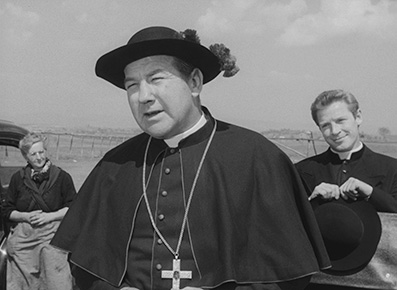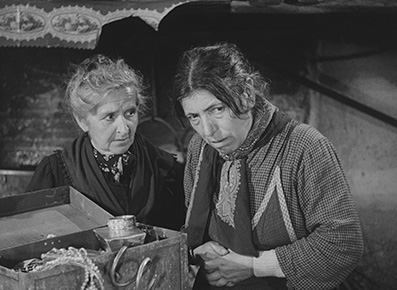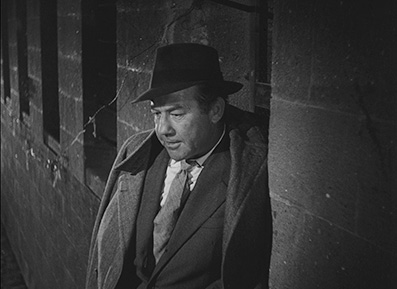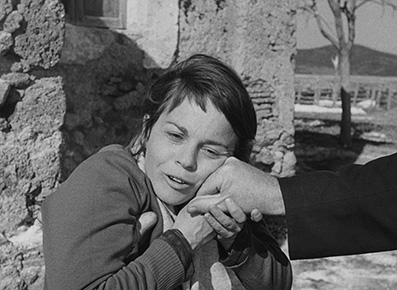"Felliniesque – referring to or reminiscent of the films of Federico Fellini." |
Dictionary.com |
"Felliniesque has come to mean a certain Italian sophistication yet
earthiness, a fascination with the bizarre yet a love of simplicity all
wrapped in a flamboyant Mediterranean approach to life and art." |
Bernard A. Cook, Europe Since 1945: An Encyclopaedia |
"Felliniesque is a style of filmmaking where dreams
and reality are perceived as one experience." |
http://www.felliniesque.com |
There are precious film filmmakers whose name has become an acknowledged adjective, and the selection process appears to have been somewhat arbitrary. The American collection includes the likes of Wellesian, Hawksian, Fordian, Spielbergian and Lynchian. But when was the last time you heard a film or a scene described as Scorsesean, Sirkian, Romeroian or Peckinpahian? Is it because these words look so clumsy written down?
There's a similarly strange division in European cinema, as despite being brothers of the Nouvelle Vague, Gordard gets an adjective and Truffaut doesn't. It's the same with Italian contemporaries Roberto Rossellini, Vitorio De Sica and Federico Fellini. The first two get naff all, but Fellini gets Felliniesque, a word that has been in wide use for long enough to earn an on-line dictionary entry. Take another look at those three definitions at the top. The first one is simply a cold statement of fact and provides no real explanation of what being "reminiscent of the films of Federico Fellini" actually means. That's what the other two have tried to nail down. But it seems to me they're referring to very specific aspects of certain films only, those elements we like to think make us instantly aware that we are watching film by Federico Fellini. In that respect, his 1955 film Il bidone (which has been translated both as The Swindle and The Swindlers – both are appropriate in slightly different ways) would not be described as Felliniesque. Made immediately after his internationally acclaimed La Strada, Il bidone has its roots in post-war Italian neorealism and has none of the eye-catching décor or poetic surrealism that characterised so many of his later films and provides no stylistic safety net for the emotional impact of its drama and its social critique.

As the film opens, we are introduced to what we gradually realise are a trio of professional con-men – Roberto, Picasso and the older Augusto (shady organiser Baron Vargas never takes part in the jobs themselves) – who roll up unannounced at a remote farm owned by two cash-strapped sisters, dressed as church representatives and bearing a tall tale of a death-bed confession, one that has pointed them to the body of a murdered man buried on their farmland. Their intention, they claim, is to properly dispose of the poor man's remains, but buried with the corpse is a chest full of treasure that the now deceased murderer has requested be given to the owners of the land on which the terrible deed took place. His only stipulation is that the beneficiaries give the bishop a tidy cash sum to pay for five hundred masses to be said for his salvation, money the two women borrow against treasure they do not realise is next to worthless.
It's an increasingly discomforting scene to watch, the injustice of the scam given extra weight by the wide-eyed desperation of the two women, their trusting reverence for anyone dressed in religious garb, and the cocksure indifference to their plight shown by this unscrupulous trio. Yet having painted a most persuasive picture of the men as amoral swine, Fellini promptly invites us to engage with them as rounded and likeable characters. Now when I say promptly I'm actually understating the case, as immediately following their return to Rome the first thing we see is Picasso arriving home at his run-down apartment and being warmly greeted by his young daughter and his loving wife, on whom he bestows gifts like a regular family man returning from a particularly successful day at the office, which for all they know he is.
Initially this switch of empathic viewpoint comes as something of a jolt, but over the course of the scenes that follow we do get to like these men, not for what they do but who they really are. Well, two of them we do – Ricardo is shown to be a dick from the start and is clearly never intended to engage our sympathies, yet still plays an essential role in the narrative that unfolds. But over the course of the film's midsection it becomes clear that Picasso – so nicknamed because if his aspirations as a painter – is going to have to choose between his love for his family and his chosen lifestyle, a looming decision that is slowly tearing him apart. For the older Augusto the damage has already been done, the details of which are outlined with exquisite economy in a chance meeting with his estranged daughter Patrizia. It's an encounter that potentially will help him to rediscover his humanity, right up until the moment his past catches up and explodes in his face.

In the process of crafting such a moving human drama, Fellini also delivers a social critique that is as sadly relevant as it ever was, as the poorest and most vulnerable members of society are robbed of what little they have by amoral men looking to line their own pockets. This is really brought home by the group's second on-screen con, as they arrive at a shanty-town in the guise of government officials offering council house places for anyone who has the money for a deposit and are mobbed by locals desperate to escape their miserable living conditions, unaware that the money they all too willingly surrender will likely leave them destitute for years to come. It's here that our new but still fragile loyalty to Augusto and Picasso is first really tested, but while in the opening con they come across as unfeeling bastards who need a serious slap, as the second con unfolds the hope is that they will see the error of their ways and find a better way to make a living before it's too late.
These conflicting emotions are heightened by the sure knowledge that such men would (and indeed do) thrive in our own current greed-driven climate, where the poor are considered fair game for any unscrupulous git willing to exploit their desperation in the name of capital gain, while government policy appears designed to keep them supplied with fresh potential victims. It's an analogy followed through in the character of Rinaldo, a former colleague of Augusto whose successful swindling of others has allowed him to climb the social ladder and effectively close the door on his nefarious past. A chance meeting prompts him to invite Augusto and his colleagues to his New Year's Eve party, a swanky gathering at which this trio of lower-class criminals are effectively social outsiders, something really brought home when Roberto pockets a gold cigarette case belonging to one of the guests and is confronted by Rinaldo. It's a firm but smiling challenge that is clearly backed up by the threat of physical action, isolating Roberto and embarrassing his colleagues through guilt by association. It also serves to remind them (and us) that while the poor are considered to be fair game for their scams, the wealthy and the privileged are a protected species and thus strictly out of bounds for the likes of them.

That two of the lead roles in this Italian language film are played by American actors should not come as a complete surprise following the casting of Anthony Quinn and Richard Basehart in La Strada. The then common practice in Italian cinema of post-dubbing dialogue gave Fellini access to a wider pool of actors without having to make concessions to their lingual abilities and his choices here are spot on. Basehart once again shines as the seemingly carefree but ultimately tortured Picasso, simultaneously desperate to provide for his family but fearful of the consequences should they discover how he makes his money. But leading the pack is a quietly excellent performance from Broderick Crawford (voiced by Shakespearean actor Arnoldo Forro) who, as the pragmatic but troubled Augusto, beautifully captures the essence of a man increasingly weary of a profession whose monetary rewards are scant compensation for its morally corrosive effects. It's Crawford that makes us root for a man we should by rights want to see made to pay dearly for his actions, and he who makes the tragedy of Augusto's life hit so hard in the film's emotionally punishing final act. It's with good reason that one IMDb user review is headlined, "Broderick Crawford will make you cry."
I'm not sure what I was expecting from Il bidone, but it wasn't what I got, indicative perhaps of just how familiar we've all become with that top-quoted term and what it tends to imply. Indeed, I'd go as far as to suggest that if you didn't know in advance, then there's a good chance you'd not guess this was directed by Fellini at all. But that's not meant as a criticism either of this particular film or this director's distinctive body of work, no sir. Il bidone is an expertly crafted, consistently gripping and ultimately heart-rending drama, one whose socio-political undertones include a not-so-sly dig at the sometimes unconditional trust that too many once placed in the sanctity of religion, a message that can be transposed to include the false prophets of politics and commerce that perpetuate today. Wonderfully cast and performed (every one of the supporting players have been selected with care), Il bidone may well be one of Fellini's less known and possibly most atypical films, but as far as I'm concerned it's also one of his best.
It's got to the point where you can almost write your own review of the picture quality on any new Masters of Cinema release, so consistently impressive have they been of late, but even with that in mind the transfer here is a joy to behold. I'm not sure who was responsible for the restoration work (it's not specified in the accompanying booklet), but they've done an absolutely spanking job and the resulting 1080p transfer on the Blu-ray in this set really does look gorgeous, boasting a splendid sharpness and level of detail, a delicious contrast range even in the night scenes, and virtually no traces of dust or damage, bar a faint trace of flickering still visible in some sequences. The black levels do soften a tad in some interior locations to retain shadow detail, but are otherwise crisp. Film grain is visible but is fine enough for you to have to lean forward to see. Just lovely.

The Linear PCM mono 2.0 track has the expected range restrictions and treble bias, but is still clearer than you might expect and no trace of wear and tear.
Dominique Delouche (39:49)
The film's French second assistant director Dominique Delouche – who also worked with Fellini on Le notti di Cabiria and La Dolce Vita and later became a director in his own right – talks to Geoffrey Nowell-Smith about first meeting Fellini ("a fairy-tale experience") and his experience on the film. An enthusiastic and consistently interesting talker, he covers a lot of ground here, including Fellini's working method, the use of non-professional actors, the important roles played by cinematographer Otello Martelli, composer Nino Rota and co-editor Mario Serandrei, and the film's hostile reception at the Venice Film festival. Particularly intriguing is the discussion on working with non-Italian actors and particularly Broderick Crawford, whom Nowell-Smith claims never changed his expression (which is complete nonsense, as demonstrated even by the clips included here), and that he had to be assigned a bodyguard due to his shoot-cancelling drinking. Delouche also supplies a sobering reason why Italian films were almost always post-dubbed at this time: "Because film actors were not really considered capable... were not considered to be true actors. They had to use actors from the theatre to make a more respectable art form." Wow.
Theatrical Trailer (3:16)
Plenty of superlatives in this original Italian trailer that pronounces this "An important film – without hypocrisy" but doesn't actually tell us what the story is about.
Booklet
A typically excellent companion to the film, this 48-page booklet is fronted by the original Italian poster and includes a new essay on the film by Pasquale Iannone, a 1955 interview with Fellini by Dominique Delouche, an English translation of a very nice 1956 review of the film by French critic and theorist André Bazin, a 1957 piece, A Letter to a Jesuit Priest by Fellini himself, a quote from Fellini on the choice of Broderick Crawford ("What a huge magnificent face Broderick Crawford had!"), a 1960 afterword, also by Fellini, titled My films don't have what is called a final scene, credits for the film, notes on viewing and a number of stills.
Slammed on its release and apparently booed at Venice, Il bidone is now rightly regarded as one of Fellini's finest films and it's easy to see why. A superb choice for Eureka's Masters of Cinema series, it looks terrific here and the extra features, though small in number, are splendidly targeted. Highly recommended. Just don't call it Felliniesque.
|